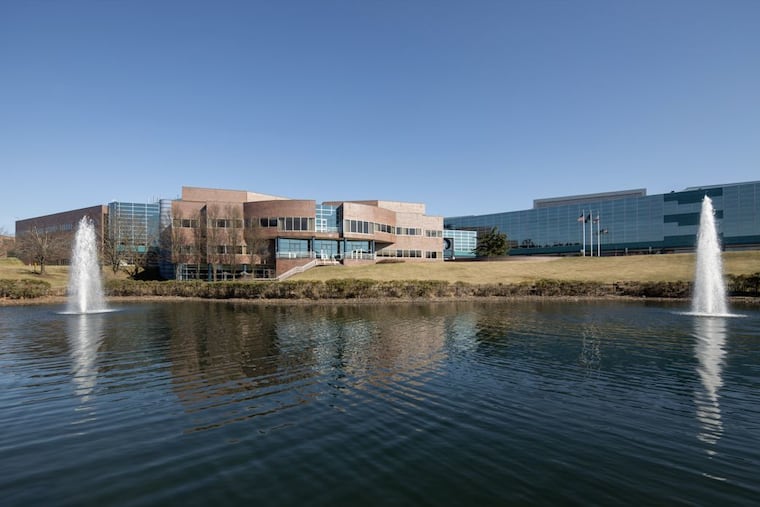Penn Medicine gene therapy lab inks deal with Center for Breakthrough Medicines in KOP
The deal could add up to $75 million for Penn Medicine's gene therapy group, led by Jim Wilson, over 15 years.

University of Pennsylvania professor James Wilson signed a five-year renewable deal on behalf of his gene therapy laboratory to license its manufacturing process to the Center for Breakthrough Medicines, based in King of Prussia.
The center, in turn, has the exclusive right to make the Penn gene therapy lab’s manufacturing and analytics process available to other biotechnology and drug companies.
Under the agreement, Wilson’s laboratory at Penn will receive $5 million in research funding a year — with an option to renew for up to 15 years, for a potential investment of $75 million — from the Center for Breakthrough Medicines, a contract development manufacturer specializing in cell and gene therapies. The center serves other firms on a contract basis to provide services from drug development to manufacturing, enabling companies to focus on drug discovery and marketing.
A shortage of expensive-to-build biotechnology laboratory and manufacturing space has prompted high demand for such facilities.
J. Brian O’Neill, who founded Recovery Centers of America, a chain of alcohol and substance abuse rehabilitation centers, has been promoting his King of Prussia development project — called Discovery Labs and the center, which he also owns — as an answer.
He is outfitting space that could grow to roughly 700,000 square feet over time, said Audrey Greenberg, O’Neill’s co-founder of the center.
Currently, the space including offices and warehouse occupies 200,000 square feet, with the next 300,000 coming online later this year or early 2023. Wilson’s gene therapy operation currently operates in about half of the planned 150,000 square feet, with the other half expected to open later this year. Other tenants include British drugmaker GSK and WuXi Biologics, a Chinese-based contract development manufacturing organization.
High-tech space that fosters research and manufacturing may mean faster approval from regulators, allowing small biotech firms, universities, and large drug firms to advance from discovery to human studies with less risk and expense. This partnership gives “our clients the potential to advance to investigational drug with a high-quality process, materials and analytical methods,” Greenberg said.
Demand for labs from biotech start-ups and gene therapy companies, in particular, is booming in the region. Spark Therapeutics is slated to build a $575 million facility on Drexel’s campus, and other labs are expected in the former Budd Co. plant in North Philadelphia and former Hahnemann hospital facilities.
Landlords are also scrambling to retrofit existing office space to accommodate life-science labs. Brandywine, for example, is turning a 50,000-square foot section of the Cira Centre tower near 30th Street Station into lab and research space, while Keystone Property Group has transformed sections of its Curtis building across from Washington Square into life-science labs and offices for such tenants as brain cancer vaccine developer Imvax Inc. and Vivodyne.
In 2020, O’Neill announced he was building the labs facility at a cost of $1.1 billion. Health-care private equity firm Deerfield Management of New York City was also an investor.
O’Neill’s property is part of a planned network of lab and office buildings occupied by life-science tenants. The other components of Discovery Labs consist of The Inquirer’s former Schuylkill Printing Plant and office-park buildings that O’Neill’s business bought from Liberty Property Trust.
Wilson heads Penn Medicine’s gene therapy program and his lab helped develop three cell and gene therapy compounds (Glybera, Luxturna, and Zolgensma). Wilson has also helped develop several viral vectors, inactivated viruses that deliver replacement genes into the body, that he has licensed to companies.
Funded by SK Inc.
Earlier this month, the Center for Breakthrough Medicines received an infusion of $350 million from SK Inc., a publicly traded South Korean conglomerate that specializes in semiconductors, energy and now health care. Some of that $350 million will go toward funding the Penn partnership, Greenberg said.
Building gene therapy and other biotech drug production space is “very capital intensive. It’s expensive to build, costing up to $1,000 to $2,000 per square foot, when you factor in bioreactors and clean rooms, HVAC requirements and expertise,” Greenberg said. “A lot of money is going to hiring and training employees.”
The center employs 150 people and hopes to expand to 600 employees by year end.
In addition, the space will allow other start-up companies a place to outsource drug research and production.
“Our collaboration with ... Penn will allow the ability to offer accelerated gene therapy manufacturing services under one roof regardless of where a program is in its development timeline,” Joerg Ahlgrimm, president and CEO of the center, said in a statement.